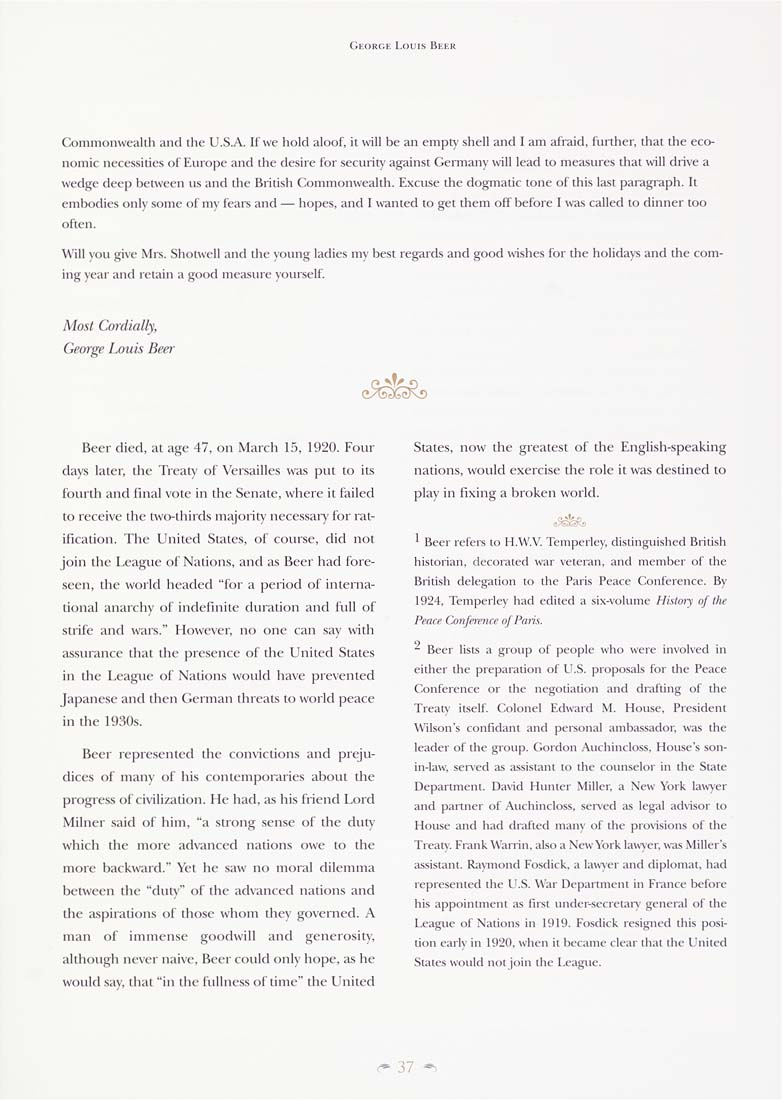Columbia Library columns (v.44(1995))
(New York : Friends of the Columbia Libraries. )
|
||
|
|
|
|
| v.44,no.2(1995:Autumn): Page 37 |

George Lours Beek Commonwealth and the U.S.A. If we hold aloof, it will be an empty shell and I am afraid, further, that the eco¬ nomic necessities of Europe and the desire for security against Germany will lead to measures that will drive a wedge deep between us and the British Commonwealth. Excuse the dogmatic lone of this last paragraph. It embodies only some of my fears and — hopes, and I wanted to get them off before I was called to dinner too often. Will vou give Mrs. Shonvell and the young ladies my best regards and good wishes for the holidays and the com¬ ing year and retain a good measure youi"self. Most Cordially, George Louis Beer (M55(^cks Beer died, al age 47, on March 15, 1920. Four days later, the Treaty of Versailles was put to its fourth and final vote in the Senate, where it failed to receive the two-thirds majority necessary for rat¬ ification. The United States, of course, did not join the League of Nations, and as Beer had fore¬ seen, the world headed "for a period of interna¬ tional anarchy of indefinite duration and full of strife and wars." However, no one can say with assurance that the presence of the United States in the League of Nations would have prevented Japanese and then Ciermaii threats to world peace in the 1930s. Beer represented the convictions and preju¬ dices of many of his contemporaries about the progress of civilization. He had, as his friend Lord Milner said of him, "a strong sense of the dtit\' which the more advanced nations owe to the more backward." Yet he saw no moral dilemma between the "duly" of the advanced nations and the aspirations of those whom they governed. A man of immense goodwill and generosity, although never naive, Beer could only hope, as he would say, that "in the fullness of time" die United States, now the greatest of the English-speaking nations, would exercise the role it was destined to play in fixing a broken world. ^ Beer refers to H.W.V. Temperley, distingiiished British historian, decorated war veteran, and member of the British delegation to the Paris Peace Conference. By 1924, Temperley had edited a six-volume History of the Peace Conference of Paris. ^ Beer lists a group of people who were involved in either the preparation of U.S. proposals for the Peace Conference or the negotiation and drafting of the Treaty itself. Colonel Edward M. House, President Wilson's confidant and personal ambassador, was the leader of the group. Gordon Auchincloss, House's son- in4aw, served as assistant to the counseloi" in the State Department. Da\id Hunter Miller, a New York lawyer and partner of Auchincloss, seized as legal ad\isor to House and had drafted many of the prorisions of the Treat}'. Frank Wanin, also a New York lawyer, was Miller's assistant. Ra>'mond Fosdick, a lawyer and diplomat, had represented the U.S. War Department in France before his appointment as first under-secretaiy general of the League of Nations in 1919. Fosdick resigned this posi¬ tion early in 1920, when it became clear that the United Slates would not join the League. c^ 37 =^ |
| v.44,no.2(1995:Autumn): Page 37 |







